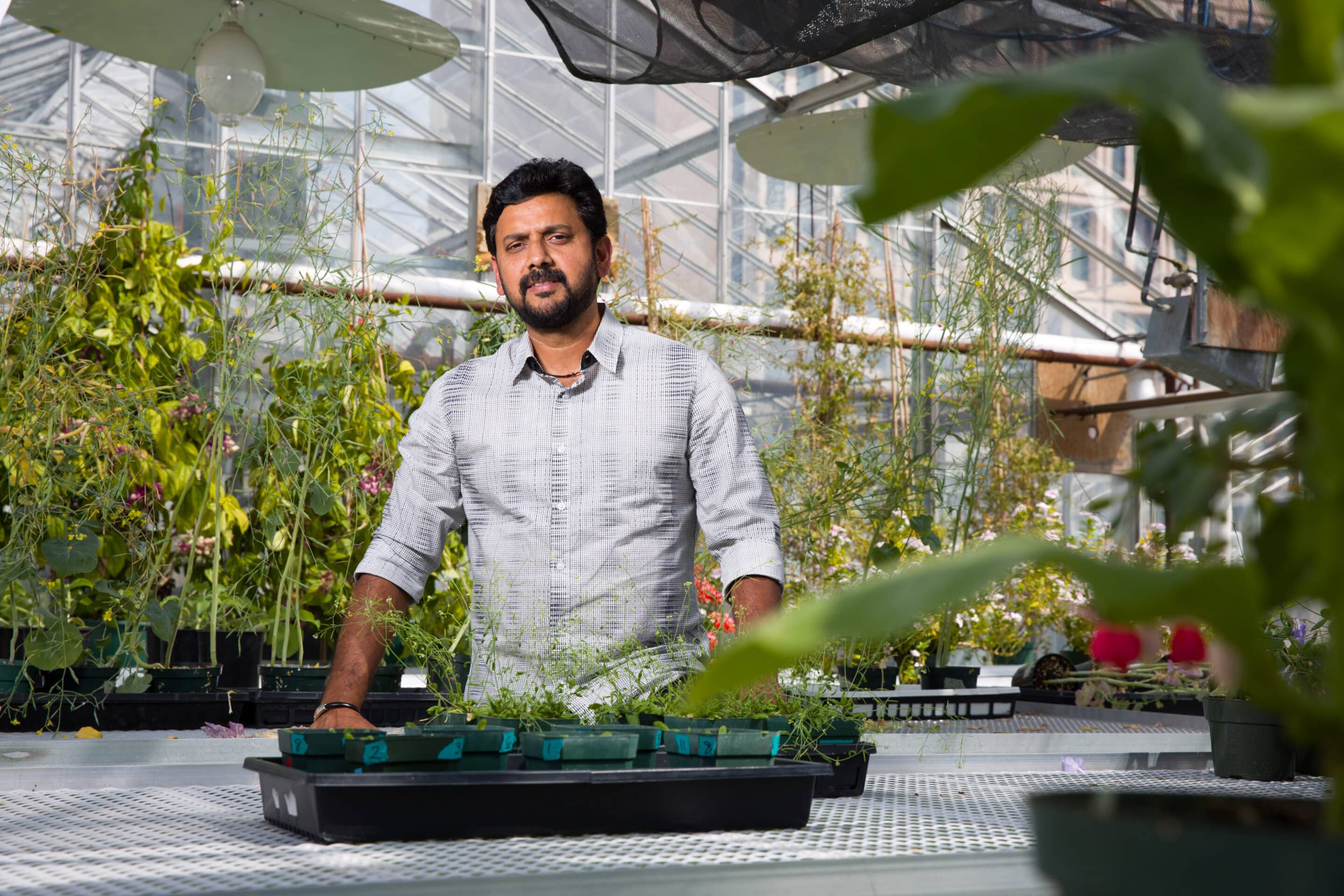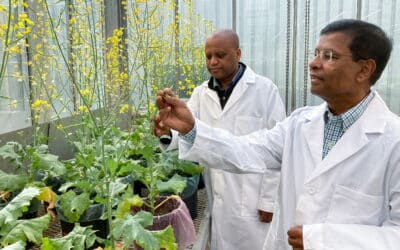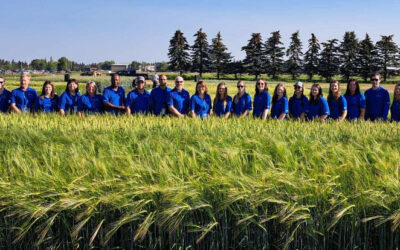Marcus Samuel has modified canola to help make the Canadian crop weather the future.
Marcus Samuel started out working on tobacco, but as he began his post-doctoral work he found his attention shifting to canola — a staple Canadian crop. He spent his post-doctoral work at the University of Toronto (U of T) working on self-compatibility in canola species in order to understand the molecular mechanisms of the oilseed.
As his studies wrapped, Samuel found himself looking for jobs working in agriculture academia as a molecular plant breeder. But it was one of his professors that pushed him to focus on canola.
“One of the profs told me, ‘Marcus do you know this green seed in canola is a big problem in industry?’ I had all the experience working with canola, I can modify canola, I can manipulate the genes in canola. So, I was like why not I embark on this,” he explains in a phone interview. “That was a moment where I thought maybe I need to do something that I can give back to the community, to the farmers.”
Samuel packed his bags and moved to Calgary, Alta. where he took a job as a professor at the University of Calgary (U of C). In the 15 years since he arrived in Cow Town he has also become the director of the greenhouse at the university and is the vice-president of Canadian Society of Plant Biologists.
“Marcus is cutting edge and he’s highly innovative. He’s a skilled researcher,” Julian Northey, CEO of Frontier Agri-Science and former U of T departmental floormate of Samuel’s, says in a phone interview. “He has been supplying ideas and technical expertise in the field on all sorts of things like developmental biology, genetics, crop development to the industry for over a decade.”
Samuel grew up in India where he received his bachelor’s degree in agriculture and his master’s degree in plant biotechnology. He then moved to Canada to study for his PhD at the University of British Columbia where he focused on the molecular biology of plants and how plants respond to stressors. Samuel then moved across the country to the U of T for his post-doctoral work which is where he was introduced to the world of canola.
No one Wants Green Canola Seeds
Samuel’s first task after finishing his studies was looking at what was causing those pesty green canola seeds. As he started at the U of C in 2008, he worked on developing a program to look into why canola seeds stay green under frost conditions.
“When they are hit for with frost, you get the green seed level going up in canola and that is a major loss in the industry. If the quality drops, the price for your canola drops. So then we figured out the genetic network that actually controls this pathway,” Samuel explains.
From there Samuel and his team found if they overexpressed one gene, then the issue of green seed is solved. They published several papers on their findings which then brought the industry knocking. Samuel says they have ongoing projects right now where they are working on bringing this canola technology to market.
Solving the green seed canola problem isn’t the only thing Samuel has done in his time at the U of C. He’s also spent time looking into pod shatter canola and drought tolerant crops which are becoming more important as climate change raises temperatures around the globe.
Working Together to Make Crops More Resilient
Northey met Samuel while he was completing his own PhD studies at the U of T. Northey’s PhD work had focused on drought tolerant wheat lines and as he wrapped up his studies Samuel and him both felt there were some unanswered questions.
Northey founded Frontier Agri-Sciences in 2010 and quickly partnered with Samuel for his wheat breeding work. In 2012 the two started their work focusing on creating a non-GMO approach to improving water use efficiency and drought tolerance in crops.
“We figured out a chemical screen. What you do is you mutate your seeds, it could be any seeds, like canola seeds, wheat seeds, pulse seeds, and then you put it on this chemistry. This chemistry is quite innovating to the seedling growth — we are looking for mutants that can grow on this chemistry. If anything would survive and grow on this particular chemical then we know based on our fundamental discovery that these plants would be drought tolerant,” Samuel explains.
Once they got to the point where they were able to do some small-scale field trials, their results showed yield increases. They applied for a grant from Genome Alberta which they were granted in 2019, and recently they were also awarded a grant from the Agricultural Development Fund (ADF). The purpose of the ADF grant is for them to breed their best drought tolerant wheat lines into Agriculture and Agri-food Canada’s own elite wheat lines.
Frontier Agri-Science isn’t the only company Samuel is working with, he’s also collaborating with Nutrien on developing a pod shatter canola line for the company. Samuel’s team discovered some shatter tolerant genes that weren’t patent protected. They showed these genes to Nutrien and Nutrien asked them to use these genes to make elite canola lines.
“So we are working with Nutrien in both gene editing and mutational approach to create a shatter tolerant line for the company,” Samuel adds.
Samuel is also working with a company called Farmer’s — Legacy Biotech to develop a canola oil that’s similar to coconut oil. Farmer’s — Legacy Biotech wants to create a canola oil that is a coconut like oil that can be used as a substitute for palm oil which is taken from forests in Southeast Asia and isn’t sustainable.
“It’s called metabolic engineering where we tweak about six genes at the same time to create this. So, it’s ongoing, we don’t even have preliminary data from it, we are waiting for some results. Very exciting times,” he says.
For Samuel plant breeding is a long and invigorating process. While he may not have any of his technology out in fields yet, he’s optimistic about the future of the work he is doing.
“That’s how we work. We keep finding new things and see who wants to partner,” he says.
Header photo — Marcus Samuel, a professor at the University of Calgary, stands in one of the university’s greenhouses. Photo: University of Calgary
Related Articles
Boosting the Protein Content in Crops
Western Canada Canola Performance Trials Ending
Better Seed Genetics Push Straight Cutting Canola Trend Forward





